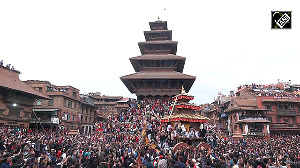"Blood and water cannot flow together," Prime Minister Narendra Modi said on Monday as he chaired a review meeting of 56-year-old Indus Water Treaty during which it was decided that India will "exploit to the maximum" the water of Pakistan-controlled rivers, including Jhelum, as per the water sharing pact.

Held amidst heightened tension between the India and Pakistan, the meeting also decided to set up a inter- ministerial task forces to go into the details and working of the treaty with a "sense of urgency", senior government sources said.
Attended by National Security Advisor Ajit Doval, Foreign Secretary S Jaishankar, the Water Resources Secretary, and senior PMO officials, the meeting also noted that the meeting of Indus Water Commission can "only take place in atmosphere free of terror". The commission has held 112 meetings so far.
"Prime Minister's Modi's message at the meeting was that 'rakt aur paani ek saath nahin beh sakta' (blood and water cannot flow together)," sources said.
Apart from deciding to exploit to the maximum the capacity of three of the rivers that are under Pakistan's control -- Indus, Chenab and Jhelum -- in the areas of hydro power, irrigation and storage, the meeting also agreed to review the "unilateral suspension" of Tulbul navigation project in 1987.
The sources asserted that the decision to maximise the water resources for irrigation will address the "pre-existing" sentiment of people of Jammu and Kashmir, who have complained in the past about the treaty not being fair to them.
The meeting came as India weighed its options to hit back at Pakistan in the aftermath of the Uri attack that left 18 soldiers dead, triggering demands that the government scrap the water distribution pact to mount pressure on that country.
Under the treaty, which was signed by Prime Minister Jawaharlal Nehru and Pakistan President Ayub Khan in September 1960, water of six rivers -- Beas, Ravi, Sutlej, Indus, Chenab and Jhelum -- were to be shared between the two countries.
Pakistan has been complaining about not receiving enough water and gone for international arbitration in a couple of cases.
Noting that India, a high riparian state, has been very "generous" to Pakistan, a low riparian state, with regard to the water sharing rights as a "goodwill" gesture, government sources said a "tough situation" has emerged after the recent terror strike in Uri and it was "appropriate time" to review the treaty as to how it has worked or not worked.
The Inter-ministerial Task Force, which is expected to have representatives from ministries of water, external affairs, power and finance, will look at the details of India's rights pertaining to the western rivers, which are controlled by Pakistan.
Sources also talked about government's decision to expedite work on three dams -- Pakal Dul, Sawalkot and Bursar -- on Chenab river.
Giving the details regarding utilisation of river waters for agricultural purposes, sources said under the treaty water can be used to irrigate 9.12 lakh acres which can be extended by another 4.2 lakh acres. However, India was only using it for 8 lakh acres.
On run-of-the-river hydro-electrical projects, the sources said out of 18600 MW capacity, India was only utilising 3034 MW, while projects of 2526 MW capacity were under construction and 5846 MW were at the advanced stage of approval.
"We have not exploited western rivers fully," the sources said, adding India would exercise its legal rights under the treaty to the maximum capacity.
Asked if China would react to India's decision, sources said Beijing was not a party to the Indus Water Treaty and noted that it was already building dams on Brahmaputra river water of which was shared by India and China.
Photograph: PTI











 © 2025
© 2025